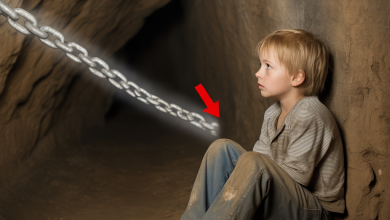She Pretended to Be Asleep. What She Saw Her Husband Do Next Shattered Her World.
The cup of tea had become a nightly ritual, a symbol of her husband’s unwavering care. Every evening, after another grueling day at the financial firm where Anna’s career was mysteriously unraveling, Hans would present it to her with a gentle smile. “Drink this, my love,” he’d say, his voice as smooth as honey. “You’re working yourself to the bone. This will help you relax.” And it did.
The tea would pull her under a heavy, dreamless tide of sleep she was powerless to fight. But she wasn't waking up rested. She was waking up shattered, her mind shrouded in a thick fog, her body aching with a fatigue so profound it felt like an illness. She was beginning to suspect that the tea, and the man who made it, were the source of a sinister plot to destroy her.
Just six months ago, Anna’s life in Berlin had been vibrant. She was a sharp, respected financial analyst, her mind a well-honed machine. Now, that machine was breaking down. Spreadsheets blurred, names of longtime colleagues vanished from her memory, and humiliating mistakes began to pile up at work. At home, she was a ghost, too exhausted to cook, to talk, to live. Hans, her husband of seven years, was publicly doting, but privately, cracks were showing—flashes of irritability and a guarded tension in his eyes that he would quickly mask with a practiced smile.
The terrifying suspicion that he was drugging her felt absurd, a violation of the trust their entire marriage was built on. But her symptoms were too specific, and her pharmacist friend, Clara, had confirmed her fears: her fatigue and memory loss were consistent with the regular intake of sedatives. «Pour it out when he’s not looking,» Clara had urged. «Document everything.» And so, one evening, Anna decided to set a trap, using herself as bait.
Her hands trembled as she took the warm cup from Hans, a faint, almost imperceptible chemical smell lurking beneath the chamomile. She forced a smile, walked to the living room window, and while pretending to gaze at the city lights, she tipped the contents of the cup into a large potted plant. Feigning a yawn, she shuffled to the bedroom and collapsed onto the bed, slowing her breathing to mimic the deep, unnatural sleep he had grown accustomed to her falling into. Her heart hammered against her ribs as she felt him linger in the doorway, watching her. Satisfied she was unconscious, he softly closed the door.
Anna waited, her senses on high alert. Minutes later, she slipped out of bed and crept to the living room. What she saw made her blood run cold. There was Hans, his face illuminated by the blue glow of her laptop, typing furiously. He was a thief in his own home, methodically plundering her life. He copied her financial records, her bank statements, her passport, even a draft of her will, onto a USB drive. He photographed her tax returns. He filled out a fraudulent loan application in her name. This wasn't a simple betrayal; it was a calculated, systematic dismantling of her identity, all orchestrated while she slept.
The moment she saw the truth, fear was replaced by a cold, clear resolve. She was not a victim in a nightmare; she was a woman in a fight for her life. The next day, while Hans was at work, she executed her own plan with clinical precision. With Clara’s help, she packed every important document, every piece of jewelry, every bit of emergency cash she had. She met with a lawyer, Friedrich Miller, who immediately began the process of protecting her. She froze her bank accounts, changed every password she had, and filed a fraud report with the credit bureau, effectively building a digital fortress around the life Hans had tried to steal.
The frantic phone call from Hans came that evening. His access was cut off, and his voice was a cocktail of panic and rage. “I know everything, Hans,” Anna said, her voice like ice. “Your lies, your plans, the documents you stole. I know you’ve been drugging me.” A heavy silence on the other end was his only confession.
The final piece of the puzzle came from her lawyer. He had intercepted emails between Hans and his mistress, a colleague named Lina. Their correspondence laid the entire scheme bare: they planned to drain Anna’s savings, secure the fraudulent loan, and flee to a new, lavish life in Spain, leaving Anna broke, in debt, and with her career in ruins.
In the weeks that followed, Anna didn't just survive; she thrived. Freed from the poison in her life—both literal and metaphorical—her mind cleared, and her confidence returned. She earned a promotion at work, reconnected with friends, and began traveling, rediscovering the strong, independent woman who had been buried under her husband’s betrayal.
One crisp autumn day, months later, she saw him across a bustling Berlin street. He was a shadow of the man she had known, his face gaunt, his posture slumped. Their eyes met for a brief second across the distance. He looked filled with a silent plea of regret, but Anna felt nothing. She didn't slow down. She didn't look back. She just kept walking, her head held high, into the bright, clear future that was finally, completely her own.




